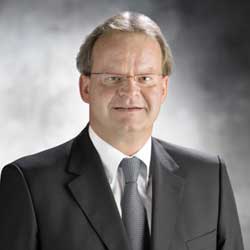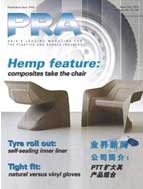 |
 |
E-News Update July 2011 |
LEAD FEATURE |
COMPANY NEWS |
MATERIALS NEWS |
MACHINERY NEWS |
INJECTION MOULDING ASIA |
PRA June-July 2011 Electronic Issue Still Available |
Lead Feature
A hallmark of German machinery
 |
It also bases its success on the wide range of machines it offers, with clamping forces between 125 kN and 5,000 kN that come complete with robotic systems, complex project systems and other peripherals.
The family-owned company, founded in 1923, started the series production of injection moulding machines in 1956 and this year it celebrates the 50th year of its Allrounder series.
PRA spoke to Michael Hehl, Managing Partner and spokesman for the Arburg management team to find out more about the winning formulae for its Allrounder series.
PRA: This year is a special one for Arburg as it celebrates the 50th year of its Allrounder modular injection moulding machines. How did Arburg commemorate this special occasion in March at its Technology Days?
Michael: The development of the Allrounder principle in 1961 laid the foundations for the Allrounder philosophy of today. Thanks to a pivoting clamping unit and interchangeable injection unit, it was possible to achieve different working positions with a single injection moulding machine. In addition to numerous milestones, such as multi-component injection moulding, for example, this formed the basis for the unique modularity of the Allrounder injection moulding machines. As a result, all our machines can today be individually configured, enabling them to precisely meet customer specifications and application-specific requirements.
At the Technology Days 2011, more than 40 hydraulic, hybrid and electric machines as well as a comprehensive range of applications provided impressive evidence that the modular Allrounder range always offers optimal solutions for all injection moulding processes and industries. The applications presented included the production of packaging and medical technology products, clean-room technology, multi-component injection moulding, micro-injection moulding, the production of technical parts and the processing of different materials, from liquid silicone (LSR) and thermosets through to metal and ceramic powders. A large part of the product presentation was dedicated to automated injection moulding systems with customised removal and post-processing concepts. Production cells with Multilift robotic systems or six-axis robotic systems showed the efficiency with which even complex high-end parts can be manufactured.
PRA: How has Arburg's business grown for its Allrounder machine since it was first developed - in terms of market share worldwide for injection moulding machines; sales of the machines to Asian countries compared to Europe and the US; expected market growth of the machine?
Michael: Since the first Allrounder was launched onto the market in 1961, the flexible modular system has been able to score points with customers worldwide on account of its individual adaptability to different injection moulding processes.
Over the years, the unique modularity of the Allrounder injection moulding machines has developed from the Allrounder principle. This unique selling point has made a significant contribution to continuously increasing Arburg's market share of machine volumes worldwide.
This trend has continued until today. A few key figures illustrate the dynamics contained in this idea: In 1973, only 12 years after the launch, 15,000 of these machines had already been sold worldwide. The company's export share in that year was around 50%. In 1978, the 25,000th Allrounder was delivered and in 1988, the total reached 50,000 injection moulding machines.
Asia, as a major motor for world economic growth, naturally assumes an important position in this context. With three wholly-owned subsidiaries in China alone, further affiliated companies in Thailand, Malaysia, Singapore and Indonesia, as well as trading partners in other Asian countries, we are perfectly positioned in the region to provide a comprehensive pre-sales and after-sales service to our local customers. That this strategy has succeeded is amply demonstrated, for example, by the development of the customer structure in China. Initially, all activities were concentrated on the familiar German, European and American customers who had set up production facilities in the region. Today, an increasing proportion of the business is conducted with local Chinese customers, with the trend continuously increasing.
PRA: What technological developments have been made in the machine since the Allrounder was first designed 50 years back?
Michael: The modular Allrounder philosophy was one of the building blocks for all further technological developments at Arburg. Listing all of the innovations of the past five decades would certainly require far more time than is available here.
At this point, I would therefore like to mention just a few of the outstanding milestones, such as multi-component technology in 1961, which only became possible through the Allrounder principle, electric dosage in 1962, the world's first microprocessor control system for injection moulding machines in 1975, the position-controlled screw for high moulded part quality in 1981, the Arburg host computer system (ALS) for central data communication in 1986 and the unique Selogica machine control system with sequence editor in 1993, which we independently build and continuously develop to this day.
Of course, the same applies to our machine range, which includes electric, hybrid and hydraulic Allrounders and a clamping force spectrum from 125 to 5,000 kN. In addition to horizontal injection moulding machines, Arburg also offers a wide range of vertical machines. Further innovations such as our Multilift robotic systems and the establishment of the project department, i.e. the design and implementation of individual automation solutions, are also closely associated with the flexible Allrounder concept.
PRA: What are the latest models to have been introduced to the range recently?
Michael:The modular design of our Allrounders also offers decisive advantages with regard to new developments that can be perfectly combined with proven components. For example in 2009, we launched our high-performance, hybrid Allrounder Hidrive machines onto the market, which are characterised by high productivity, short cycle times and energy efficiency. These are also important for the Asian region. Featuring servo-electric clamping units, hydraulic injection units with position-regulated screws and adaptive hydraulic accumulator technology, the Hidrive machine series once more brings together the best components from the Arburg modular system.
The targeted expansion of this series up to a clamping force of 5,000 kN was continued at the K 2010 with the Allrounder 920 H. This machine is characterised by a newly designed servo-electric toggle-type clamping unit and very short dry cycle times which, depending on the application, can be less than 2 seconds.
A brand new addition to the range is the Allrounder Edrive series, which was presented at this year's Technology Days in Lossburg and which supplements our electric machine range. The Allrounder E machines enable a wide range of applications, are characterised by an attractive price level and make the use of Arburg electric machines advantageous, even for standard applications.
PRA: What are the features and benefits available on the latest Allrounders?
Michael: In addition to the high quality, precision and reliability, for which our Allrounders are renowned throughout world, it is especially the energy-efficient operation of the Allrounder that is worthy of mention - a characteristic which is of increasing importance for the Asian markets, as the Chinaplas 2011 demonstrated.
In terms of its products, Arburg therefore offers a broad range of energy-efficient injection moulding machines, all of which carry the Arburg "eČ" energy-efficiency label. These extend from the appropriately equipped hydraulic machines through the hybrid Allrounder Hidrives to the electric machine series. However, we consider the complex subject of energy efficiency in the overall context and therefore also place great importance on a holistic support offering with regard to our service activities.
The efficiency of moulded part production is set to gain increasing importance in the future. The aim here is to produce high-quality parts at minimal unit costs. In addition to energy efficiency, important factors in this context are high productivity and availability as well as short cycle times. We take all of these aspects into account when creating and developing our products. Our Selogica machine control system also makes an important contribution to efficient moulded part production. Its operating philosophy not only permits simple, fast and reliable programming of our Allrounders. Thanks to its numerous set-up and documentation features, the personnel is also able to optimally prepare and implement the relevant production process, which in turn has a positive influence on quality, speed and energy efficiency.
PRA: In terms of competitive strength, how does the Allrounder range of machinery compare to what is available from competitor machinery suppliers?
Michael: We do not, of course, talk about our competitors on the market. However, it is certain that our concept of modular, and thus individually-adaptable injection moulding technology, is well balanced and diversified both from an economic and a technical point of view. For this reason, our range of technologies is also very well received worldwide. Our new products frequently arouse great interest among industry experts and our company statistics clearly show that with our offering and, not least on account of our worldwide service, we precisely meet the requirements of our customers.
PRA: What is future outlook of the Allrounder in the market?
Michael: In the future too, our injection moulding technology will of course be oriented towards the requirements of our customers from the various industries. Owing to the universal basis that our Allrounder philosophy represents, we have the necessary flexibility to immediately respond to the requirements of the markets. In addition to specially-adapted machines for the packaging, medical technology/optics, electronics or automotive industries, for example, we are also planning innovations, which are aimed towards further automation of the injection moulding processes through complete production cells. Integration of upstream and downstream processing steps is the key here.
Together with our activities for increasing the efficiency of moulded part production and the expansion of our worldwide presales and aftersales services, we believe that we are well positioned to establish Arburg as a leader among international manufacturers of high-end injection moulding technology in the long term.

